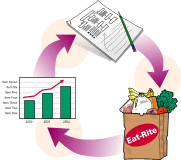|
|
|
|
|||||||||||
|
|
|||||||||||
|
|
Key Nutrition Resources |
|
|||||||||
|
|
|||||||||||
|
|
|
||||||||||
|
|
|||||||||||
|
|
|||||||||||
Planning, Implementing, and Evaluating Interventions
 These resources are complied to aid health professionals in activities
related to the planning, implementing, and evaluating of intervention
programs.
These resources are complied to aid health professionals in activities
related to the planning, implementing, and evaluating of intervention
programs.
- Intervention Effectiveness
- Community Engagement
- Planning and Evaluation
- Health Communication Resources
- Social Marketing Resources
Intervention Effectiveness
The Community Guide – Nutrition*
The Community Guide conducts systematic reviews to summarize what is known
about the effectiveness, economic efficiency, and feasibility of
interventions to promote community health and prevent disease. This link
provides information about reviews that are planned or in progress regarding
the effectiveness of selected population-based intervention programs
addressing nutrition.
Community Engagement
Engaging Faith-based Communities as Partners in Improving Community Health![]() (PDF-1.3 Mb)
(PDF-1.3 Mb)
This document contains highlights from a CDC/ATSDR forum addressing:
separation of church and state; the science supporting work with faith
communities; and exemplary partnerships.
Principles of Community Engagement
This resource provides public health professionals and community leaders
with a science base and practical guidelines for engaging the public in
community decision-making and action for health promotion, health
protection, and disease prevention.
Planning and Evaluation
CDC's Community Health Resources
Search or browse through CDC's best resources to help you plan,
implement and evaluate community health interventions and programs to
address chronic disease and health disparities issues. You'll find links to
hundreds of useful planning guides, evaluation frameworks, communication
materials, behavioral and risk factor data, fact sheets, scientific
articles, key reports and state and local program contacts.
CDC Evaluation Working Group
This website provides an overview of the framework for Program
Evaluation in Public Health (MMWR September 17, 1999/48(RR11); 1–40).
School Health
Index for Physical Activity and Healthy Eating: A Self-Assessment and
Planning Guide
CDC, School and Adolescent Health
The School Health Index is a self-assessment and planning tool that
will enable schools to identify the strengths and weaknesses of their
physical activity and nutrition policies and programs. Schools can also
develop an action plan for improving student health that involves teachers,
parents, students, and the community.
Health Communication Resources
CDCynergy: A
Health Communication Planning Tool
CDCynergy, an interactive CD-ROM, is a training and decision-support
tool designed to help CDC staff and public health professionals
systematically plan communication programs within a health context.
Making
Health Communication Programs Work: A Planner’s Guide
National Cancer Institute
Making Health Communication Programs Work uses a practical approach
to guiding readers through four stages in the health communication process:
1) planning and strategy development, 2) developing and pretesting concepts,
messages, and materials, 3) implementing the program, and 4) assessing
effectiveness and making refinements. The book is available in print,
online, and CD-ROM formats.
Social Marketing Resources
Social Marketing
Resources
Social marketing uses commercial marketing techniques to affect behavior
change in individuals to promote health or improve society. These resources
are for professionals who wish to use social marketing to strategically plan
and implement programs. Links provide information on social marketing
basics; social marketing organizations, associations, and conferences; and
social marketing journals.
![]() Please note: Some of these publications are available for download only as *.pdf files. These files require Adobe Acrobat Reader in order to be viewed. Please review the information on downloading and using Acrobat Reader software.
Please note: Some of these publications are available for download only as *.pdf files. These files require Adobe Acrobat Reader in order to be viewed. Please review the information on downloading and using Acrobat Reader software.
* Links to non-Federal organizations found at this site are provided solely as a service to our users. These links do not constitute an endorsement of these organizations or their programs by CDC or the Federal Government, and none should be inferred. CDC is not responsible for the content of the individual organization Web pages found at these links.
Page last updated: December 13, 2007
Content Source: Division of Nutrition, Physical Activity and Obesity, National Center for Chronic Disease Prevention and Health Promotion
